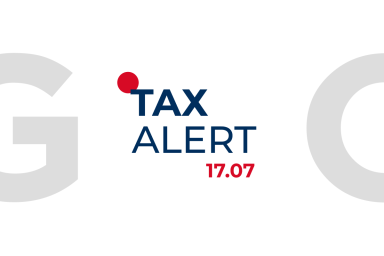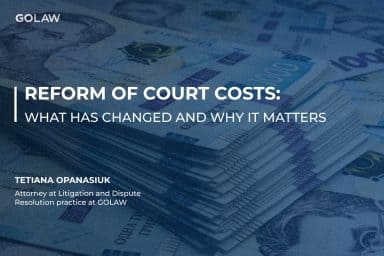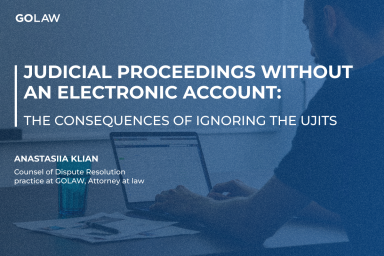Why Can’t One Manage to Obtain Consent for Bringing Politicians to Liability? – Valentyn Gvozdiy
The recently issued joint statement of the National Anti-Corruption Bureau of Ukraine (NABU) and the Specialized Anti-Corruption Prosecutor’s Office (SAPO) asserts that there is sufficient evidence to lift parliamentary immunity of the People’s Deputy Yevhen Deydey due to the fact of his illegal enrichment.
Why can’t the prosecution manage to obtain the consent for bringing politicians to liability, while allegedly all the facts point out to the fact of illegal enrichment of People’s Deputies? On July 11, 2017, the session of the Verkhovna Rada of Ukraine took place, at which the deputies considered the matters of their colleagues’ immunity. As a result of the day, three of five deputies in question lost their immunity. However, charges against the People’s Deputies Lozovyi and Deydey were found insufficiently substantiated. So can’t the prosecution manage to obtain the consent for bringing politicians to liability, while allegedly all the facts point out to the fact of illegal enrichment of People’s Deputies? Let’s consider this issue through the example of one of the deputies. The recently issued joint statement of the NABU and the SAPO asserts that there is sufficient evidence to lift parliamentary immunity of the People’s Deputy Yevhen Deydey due to the fact of his illegal enrichment. I consider it necessary to comment on this situation in terms of the legality of the Anti-Corruption Bureau’s actions in this case. Information about the investigation into the illegal enrichment of the People’s Deputy Deydey has gained resonance among the public, in particular, at the NABU’s initiative.
Obviously, the NABU has made this case public in order to get public support. Such behaviour is easy-to-understand, as this important state body is entrusted with high responsibility and Ukrainians’ expectations associated with combating corruption. The NABU and the SAPO disagree with the opinion of the members of the Regulatory Committee of the Verkhovna Rada, who opposed bringing the People’s Deputy to criminal liability and considered that the submission “contained no concrete facts”. The text, which was published on the NABU’s website, states that the members of the Regulatory Committee were presented with fragments from the video records of interrogation of one of the witnesses, records of telephone conversations, and the analysis of income and expenses of the family of the People’s Deputy. According to electronic declarations, Yevhen Deydey’s wife has financial obligations to the citizen Linchevskyi in the amount of UAH 3,500,000, which became the main subject of the case. The NABU and the SAPO regard this loan as an attempt to legalise the deputy’s illegal income.
As a lawyer, I find it difficult to approve of the work methods of the NABU and the SAPO in this and similar cases, as the main evidence – fragments from video records of interrogations and records of telephone conversations – were publicly disclosed, thereby violating the secrecy of pre-trial investigation and the secrecy of communication. Getting a loan mentioned above is the key fact in this case. In the fragments from Mr Linchevskyi’s interrogation, the emphasis was laid on the details of the credibility of the transfer of funds and such facts as when and by whom they were transferred and received; moreover, the investigators asked about the availability of the receipt. According to the witness’ testimony, there was no receipt of the transfer of the corresponding amount as a loan, because being Mr Linchevskyi’s friend the People’s Deputy enjoys his trust. In this case, the lack of a documentary confirmation, in particular, a receipt confirming the way of receiving funds, already gives rise to doubts regarding the method in which they have been received. Accordingly, absence of such document is the main ground for initiation of investigation.
In the first place, such evidence as the testimony of witnesses and materials collected during the covert investigative activities are collateral evidence, and, in the second place, their disclosure at the given stage is illegitimate. As regards the witness, Mr Linchevskyi, whose interrogation video record was made public, it should be noted that in case the investigation suspected him of giving false testimony, it should have opened separate criminal proceedings based on this fact and verified the witness. If the fact of false testimony were established, the witness would be brought to criminal liability. However, this is already the area of responsibility of those who investigate the proceedings and those who gave the witness such advice (if such advice was given at all).
Owing to the fact that the People’s Deputy Yevhen Deydey is a representative of the state power, as all other subjects of declaring, he has to understand the need to justify his income. The electronic declaring was not a tax amnesty, but not everybody understood that when indicating their income of dubious origin. For now, the absence of receipt throws suspicion on the credibility of Yevhen Deydey’s financial obligations to Mr Linchevskyi and, as a result, on the uncertain origin of the deputy’s funds in the amount of UAH 3,500,000. I am sure that this and other similar stories of our people’s elects accused of violating the law will have their continuation, and the result will fully depend on the professionalism of both the prosecution and the defence. There is no place for politics and populism here.

Dr. Valentyn Gvozdiy
Managing Partner, Attorney at law, PhD
- Contacts
- 31/33 Kniaziv Ostrozkykh St, Zorianyi Business Center, Kyiv, Ukraine, 01010
- v.gvozdiy@golaw.ua
- +38 044 581 1220
- Recognitions
- ITR World Tax 2025
- LEXOLOGY INDEX 2025
- The Legal 500 EMEA 2023
- Who’s Who Legal 2022
Sign up to be aware
New achievements are inspired by information. GO further, don’t miss out GOLAW news and legal alerts
Our expertise
-
- Antitrust and Competition
- Banking and Finance
- Compliance, Corporate Governance and Risk Management
- Corporate and M&A
- Criminal and White Collar Defence
- Defense in Anti-corruption procedures and regulations
- Labor and Employment
- Natural Resources and Environment
- Government Relations (GR)
- Insolvency and Corporate Recovery
- Intellectual property
- International trade
- Legal support of business and private Сlients in Germany
- Litigation and dispute resolution
- Private clients
- Real Estate and Construction
- Energy and Natural Resources
- Restructuring, Claims and Recoveries
- Martial Law
- Tax and Customs
-
- Agribusiness
- Aviation
- Chemical industry
- Engineering, Construction and Building Materials
- Natural Resources and Environment
- Financial institutions
- IT and AI
- Industry and manufacturing
- Healthcare industries, Life sciences and Pharmaceuticals
- Media, Entertainment, Sports and Gambling
- Retail, FMCG and E-Commerce
- Transport and Logistics
We use cookies to improve performance of our website and your user experience.
Cookies policy
Cookies settings







